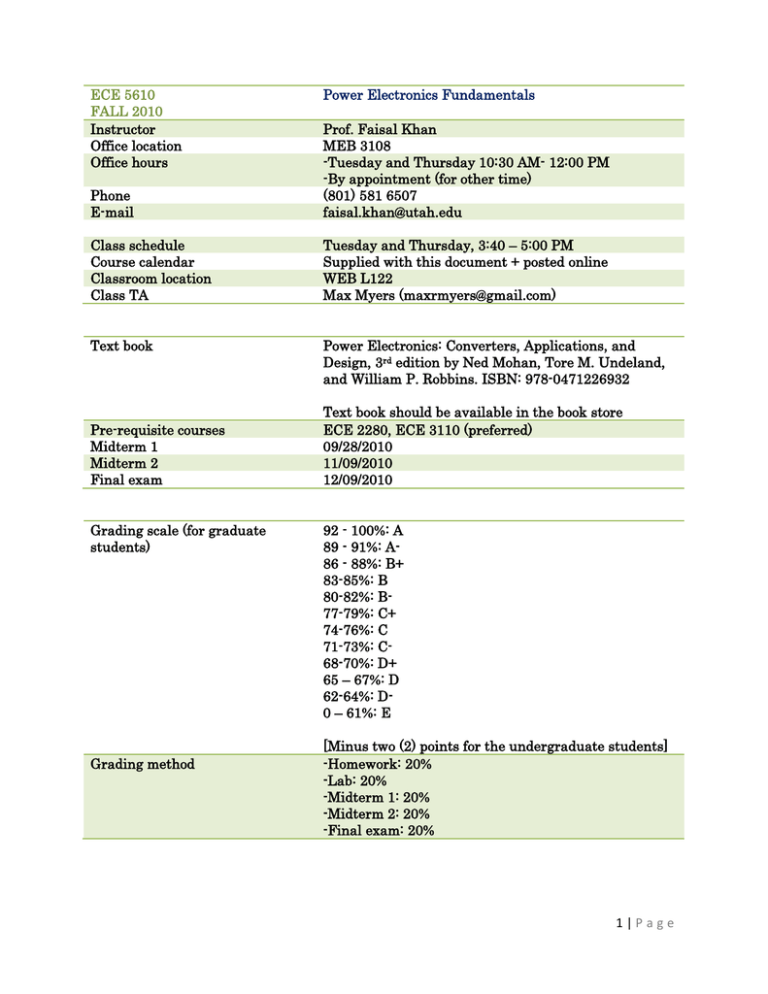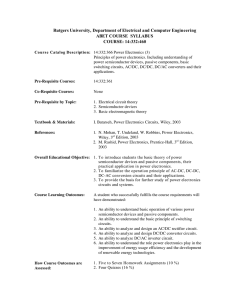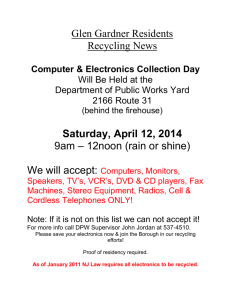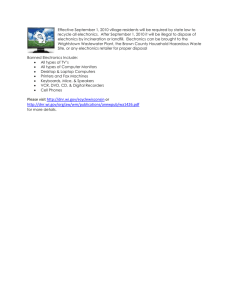ECE 5610 FALL 2010 Power Electronics Fundamentals Instructor
advertisement

ECE 5610 FALL 2010 Instructor Office location Office hours Power Electronics Fundamentals Phone E-mail Prof. Faisal Khan MEB 3108 -Tuesday and Thursday 10:30 AM- 12:00 PM -By appointment (for other time) (801) 581 6507 faisal.khan@utah.edu Class schedule Course calendar Classroom location Class TA Tuesday and Thursday, 3:40 – 5:00 PM Supplied with this document + posted online WEB L122 Max Myers (maxrmyers@gmail.com) Text book Power Electronics: Converters, Applications, and Design, 3rd edition by Ned Mohan, Tore M. Undeland, and William P. Robbins. ISBN: 978-0471226932 Pre-requisite courses Midterm 1 Midterm 2 Final exam Grading scale (for graduate students) Grading method Text book should be available in the book store ECE 2280, ECE 3110 (preferred) 09/28/2010 11/09/2010 12/09/2010 92 - 100%: A 89 - 91%: A86 - 88%: B+ 83-85%: B 80-82%: B77-79%: C+ 74-76%: C 71-73%: C68-70%: D+ 65 – 67%: D 62-64%: D0 – 61%: E [Minus two (2) points for the undergraduate students] -Homework: 20% -Lab: 20% -Midterm 1: 20% -Midterm 2: 20% -Final exam: 20% 1|Page Course description This new course will introduce the power electronics basics and its applications. Students will learn about switching power converters, solid state power devices and applications of power electronics in renewable energy area. In present days, power electronics is an extremely demanding field especially for the development of plug-in hybrid vehicles and renewable energy harvesting. Therefore, this course should be considered as a gateway to many other courses in power engineering. Announcements will be posted in the course website on a regular basis. Course outcome After the successful completion of this course, students will learn: How different power converters such as ac-dc, dc-dc, dc-ac and ac-ac work. How to design power converters Power electronics for motor drives How to design switched mode power supplies Power electronics for Hybrid-electric vehicles Power electronics for PV based power generation Key terms Homework • Homework assignments and lab reports are due at the beginning of the class on its due date. • Group discussions on HW problems or exam questions are highly encouraged. Working on past years’ exam problems will help you to find a good reference point. • No late homework will be accepted under any circumstances. Please do not ask for exceptions. • Use the standard (green) engineering paper for HW submissions. Use only the top side of the paper, and use staples if you have more than one sheet. Do not fold. • It is necessary to show your work. Correct results without necessary steps will not get a perfect score. • I strongly recommend working with the course TA in advance to complete the HWs. Try to avoid seeking for last minute help from the TA. • Answers to the HW problems will not be given. However, you should always discuss your work with the TA as he will have the solutions available. 2|Page Lab work There will be five labs in this semester. Each lab will provide you the opportunity to explore a particular power converter circuit. Typically, each lab should take about two hours to complete the various steps. There will be six (6) work stations in the analog circuit lab designed to facilitate these experiments. We will schedule the lab hours by next week. Max Myers will be present in the lab to guide you in using those new installations. You need to use PSpice in order to complete these labs. In some cases, PSpice installation may take unexpectedly long time. Class TA will help you in case you have difficulty installing PSpice. As long we do not have allocated credit hours for these labs, we do not plan to spend a great amount of time for them. Two students will work in a group. One of them will prepare the simulation report, and the other student will prepare the experimental report. However, both of them are required to conduct the simulation and the experimental parts. Please report to the class TA once you form your team. Mid-term and Final exams Problems in these exams will be more challenging than the HW problems. Questions from the previous year will be supplied before the MTs and the Final exam. Even if you secure 100% in the HWs, it may not be enough to perform well in the MTs and Final. I do not want to surprise students in the MTs or Final exams. So please be prepared. Make plans if you need to see me or the TA. We will always be there to help you. I would encourage students to discuss the old questions and acquire a clear understanding of the solutions. In addition, use class lecture materials to prepare for the exams. If you can digest them well, they are the most helpful materials to perform well in the exams. Before the midterms and final exam, I will make sure that I am available for the students to answer their questions. It is optional that you may replace one of the MTs with the Final exam. If you decide to replace either MT1 or MT2 with the Final, the Final exam will carry 40% of the total score (in place of 20%). On your final exam, you may select either MT1 or MT2 if you need to replace them. The Final exam will take place during the regular class time (December 9 th) rather than the allocated time for the exams. 3|Page Expectations This is a 5000 level class, and it will have both graduate and undergraduate students. On an average, you need to spend in total 10-12 hours a week - 3 hours class, 1 hour lab and 6-8 hours of self study for HW and lab reports. Copying is self-destructive. I will not post my lectures online. So, if you miss a class, I would suggest collecting them from other students. As a 5000 level course, we need to cover a great amount of materials in the class. This is why, we will not get enough time for solving problems. You need to work yourself to understand the concept through example problems in the book. This is not a math class where we learn techniques to solve problems. If you understand the concepts, you can solve the problems in the exams. Last year’s class average was C+. Four (4) out of eighteen (18) students secured A. Students will be asked to participate in solving problems in the class. Help is available but you need to show your inclination to solve the problem. Others • This is a very interesting course with a great amount of analytical challenges. Your active participation will help other students. • Foods and drinks are not encouraged in the classroom. ****************************************************************************** ******* Students are advised to consider the “Fundamental of Engineering (FE) Exam” seriously. It is given twice per year (October and April). Details can be found here: http://www.coe.utah.edu/current-undergrad/fee.php 4|Page





